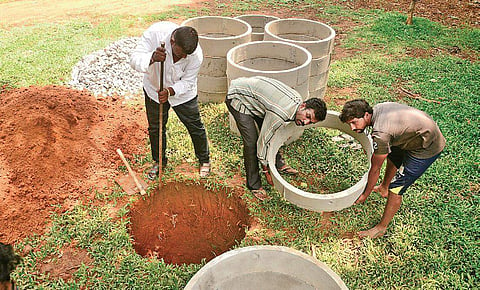

BENGALURU: As the city stares at a looming water crisis, the only people seeing a silver lining is the Raja Bhovi or the well-digging community. They’ve got their hands full – cleaning digging wells and recharge wells – with demand having spiked all of a sudden. Additionally, with the Bruhat Bengaluru Mahanagara Palike (BBMP) and Bangalore Water Supply and Sewerage Board (BWSSB) mandating all buildings of a certain size to have rainwater harvesting units, recharge wells (those that collect rainwater and pump it into the ground), Raja Bhovis are reaping the benefits.
For the Art in Transit project, well-diggers were taken on a tour of the Cubbon Park Metro station wherein students of Srishti Institute of Art, Design and Technology and Biome Environmental Solutions (an environmental planning consultancy), will paint the station on the theme of water conservation, and the unsung community of well-diggers.
“The city is in dire need of wells owing to shortage of water. Every day, we receive more than six calls from different parts of the city requesting us to dig wells. In the last two months, we have dug almost 30-40 wells,” said Chinna Muniyappa (60), who hails from the community of water harvesters, and picked up the skill from his father Chinna Muniswammy at the age of 10. “Over 25 members in my family do this for a living, and we have dug around 10,000 wells over the decades,” he added.
While people in the city opt for borewells, those on the outskirts and villages prefer open wells. “There is also a high demand for recharge wells and rainwater harvesting units, especially with the monsoons approaching,” said C Padhanna, a fourth-generation well-digger, who hails from Tamil Nadu and has dug 22,000 wells so far.
When they are not digging wells, both Muniyappa and Padhanna are cleaning open wells, digging rechargeable wells and reviving open wells in Cubbon Park. While the physical work involved is hard labour – Padhanna starts work as early as 4 am and winds up by 8 pm – one of the main challenges the community faces is the lack of education. “I dropped out after my pre-university since my financial situation did not allow me to continue my college studies.
Now, I really wish I had done my bachelors in Business Management. At least I wouldn’t have ended up having to dig wells and earn only Rs 600 a day,” said M Anandh, a 24-year-old well-digger from Sarjapur, who was forced into the business by family.
According to S Viswanath, advisor, Biome Trust, well-diggers haven’t got their due, which is why they launched a movement known as the ‘Million Wells Movement’. It focuses on digging a million recharge wells in the city. “These wells could put half of the receiving rainfall directly to the ground and it is the well digging community who can help us in this endeavour,” he said.
(Inputs by Eva Mathews)